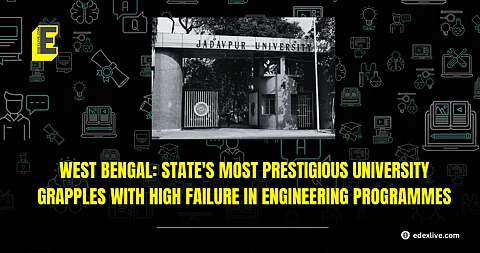
- News
- Campus
- Exam
- Podcast
- Web Stories
- Do You Know
- Path Finders - UG Programs
- Videos
- Book Review

An internal survey at West Bengal's Jadavpur University (JU) revealed that over 40% of students in nine out of 16 engineering streams have failed at least one subject, reported The Times of India.
Civil Engineering reported the highest failure rate, with 75% of students carrying backlogs, followed by Electrical Engineering at 68%, and Metallurgical and Material Engineering at 40%.
The survey, conducted by a committee formed in May 2024, highlights a significant academic challenge at one of West Bengal’s premier engineering faculties.
Committee investigation
Alerted by the high rate of backlogs, JU established a committee comprising teachers and student representatives to investigate the issue.
The committee surveyed 1,052 students and 137 teachers, with findings submitted recently.
The report noted that approximately 150 fourth-year engineering students have failed various subjects, primarily theory papers, with some accumulating up to 15 backlogs.
Poor attendance was identified as a key factor, with only 20-25 students attending theory classes in a typical class of 65.
What could be the reasons?
Faculty members stressed that low attendance significantly impacts student performance. Civil Engineering professor Partha Bhattacharya attributed the failure rates to students skipping theory classes, and an inability to cope with the curriculum.
He also noted a decline in student quality, as many high-performing students opt for centrally-administered institutes like the Indian Institute of Engineering, Science and Technology (IIEST) Shibpur and the National Institute of Technology (NIT) Durgapur.
They also suggested allocating marks for attendance to encourage participation, though existing attendance rules are not strictly enforced, as stated in The Times of India report.
Other challenges
JU alumnus and former electrical engineering professor Saswati Mazumdar highlighted a rise in student apathy toward theory classes since the pandemic, contributing to the high backlog rates.
Electrical engineering associate professor Arindam Sil pointed to a disorganised academic calendar, with added delays due to the West Bengal Joint Entrance Examinations (WBJEE) counselling.
Also JU’s academic sessions often begin in October or November, months later than central institutes, placing first-year students under intense pressure.
Delays in publishing semester results, sometimes until the middle or end of the next semester, further complicate students’ ability to manage supplementary exams alongside regular coursework.
Students say...
Students reported that the delayed result announcements pose significant challenges.
One student noted that backlogs are often released late, near the end of the current semester, making it difficult to balance supplementary exams with ongoing studies. This delay adds to the academic pressure and contributes to the high failure rates, stated the report.
